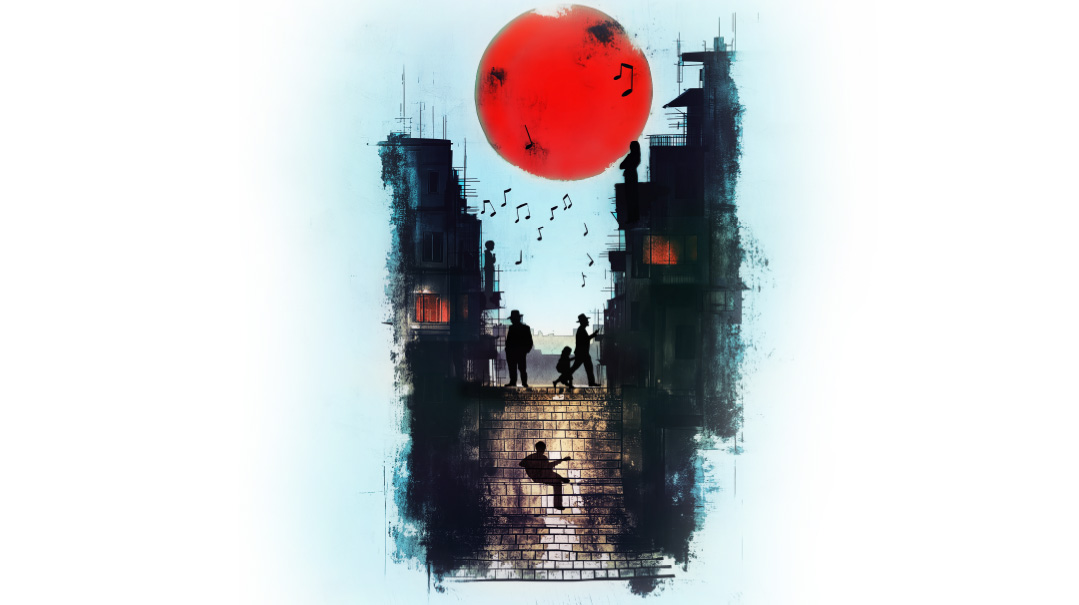Last Stop: Chapter 13
| May 16, 2023Eliezer’s temper flares. “Would you drop everything if Yudi had been arrested for arson?” he asks, his words slow and threatening

The whispers fill the building, theories like sparks that touch every corner. There were fire trucks outside the school yesterday.
The menahel’s office is totally boarded off. Everything stinks like smoke. Hey, has anyone seen Yudi Stein today?
Eliezer hears the last question as he strides past boys in the hallway, heading toward the makeshift office they set up for him in one of the resource rooms. The boys glance at him, their eyes alight with curiosity.
He doesn’t respond. Very few people know exactly what happened, and the ones who were informed are all people Eliezer trusts to be discreet. This isn’t information he wants publicized.
Yesterday, the firefighters had found enough evidence to call the fire arson. No, Eliezer had said, his voice strong. It was an accident. A simple mistake—
He’d stopped. The firefighters had looked to the corner of the office, where Yudi was huddled behind Naftali. Their faces had been polite and unreadable. If that’s how you want to play this, Rabbi, one had said.
Nothing is solved by sparing Yudi, but nothing is solved by throwing him to the lions, either. Yudi is dangerous, just as Eliezer has always suspected, but he’s desperate for redemption now, desperate to be saved.
And Eliezer finds that he wants to save Yudi, as indulgent as the emotion feels. He wants Naftali to look at him more often as he had last night: eyes gleaming, pride and gratitude within them. A younger brother who sees his big brother as worthy of admiration.
He’d never quite grasped how important Naftali’s regard was to him until he’d been gifted with it last night.
Eliezer exhales and closes the door to his temporary new office securely. Now, he has to make the phone call that he’s been dreading. He’d only gotten the Steins’ voicemail yesterday — their time zones were out of sync — but his terse message hadn’t garnered a response even though he’d stressed the urgency.
He dials again, and this time, Mr. Stein picks up. “David Stein.”
“This is Eliezer Hartman.” He doesn’t wait for a pause, for the distracted way that David Stein tends to pick up the phone. Yudi did what? Heh, kids these days. I was the same when I was his age. How can we make it better? Always that offer, as though each offense can be easily swept under the rug. It isn’t that Yudi’s parents don’t care about him. It’s just that they don’t see school or his behavior there as a priority.
Eliezer speaks without preamble. “Yudi has been suspended indefinitely.” He elucidates the breadth of what Yudi had done the day before, careful not to let any defensiveness creep into his voice. “I did consider expulsion, but Yudi seems genuinely remorseful, and I’m willing to allow him back with some provisions.”
Mr. Stein is just as businesslike, a moment of hesitation the only sign that he’s been affected by what Eliezer has shared. “I’m sure that we can help cover the repairs above what insurance will pay,” he says at once.
“That won’t be necessary.” Eliezer hardens his jaw. “I want Yudi seeing a counselor weekly. And I understand he doesn’t have much supervision at home, but he’s in a vulnerable place right now—”
Another voice chimes in on the phone, Mrs. Stein’s tone sharp and uncompromising. “He’s 16 years old. He doesn’t need a babysitter.” She pauses, then says, “If he isn’t going to school, anyway, we’ll fly him out here—”
Eliezer imagines, with a wince, the remorseful boy from yesterday given a vacation instead of a consequence. “I don’t think that’s wise,” he says carefully. “He should see a counselor in person. We’ll work out a chavrusa for him here. And I’d also like to be in touch with him during his suspension. He’s a child in crisis, and he’ll need all the support that he can get.”
Mrs. Stein says something low and irritated to her husband. Mr. Stein speaks again, his words clipped. “We’re in the middle of a delicate business venture. We can’t drop everything and go home right now.”
Eliezer’s temper flares. “Would you drop everything if Yudi had been arrested for arson?” he asks, his words slow and threatening. He has no intention of doing so, not anymore, but the Steins need to grasp the gravity of the situation.
There’s a whispered conversation and then the utter silence that means that the Steins have muted their phone. When Mrs. Stein speaks again, her voice is resigned. “I’ll be back for the weekend,” she promises. And then, grudgingly, “I appreciate your lenience in this case.”
“Yes, well.” Eliezer sighs. “We care about Yudi here, too.”
Progress, step by step. At least it’s easier to deal with Yudi’s family than it is with Yudi himself, though they’d reached an accord last night. It’ll be a challenge again when Yudi is back in school, but Eliezer has invested too much into the boy now to give up.
His next conversation will be more pleasant. Naftali has found a spot in one of the downstairs offices to work while the repairmen are busy tending to the damage. It’s small, but already crammed full of the tchotchkes that had been in his office, and he’s fidgeting with one as he keeps an eye on his computer.
Eliezer is warmed by the smile on Naftali’s face when he pokes his head in. Has it been so long since Naftali had looked happy to see him?
“I wanted to check in,” he says. “Come, walk with me.” There’s no space in the little corner for both of them.
Naftali waits until they’re walking through the quiet preschool hallway before he asks, “Were they open to what we discussed?”
“Eventually,” Eliezer allows. “They’re so used to my calls that they’ve gotten good at filtering them out. It took some pushing before they understood this was different.”
Naftali nods. “I don’t think they’re bad parents, exactly,” he says. Typical Naftali, quick to believe the best in anyone. “I’m sure they think that Yudi is doing fine. He seems happier when they’re around.” He shrugs. “They’re just… rarely around.”
“Yes, well.” Eliezer’s eyes drift to the brightly colored projects on the walls as he changes the topic. “I’ve been thinking,” he says. “Well, Rivky’s been thinking, but I’ve learned that it’s wisest to listen to her.”
“You always were smart,” Naftali says, grinning.
Eliezer plunges forward. “These… incidents with Yudi… they’ve shown me what you can do here. I thought you’d do well as a preschool rebbi’s assistant — you’re so patient — or you could work in administration in a front-facing position. You’d wind up working with the boys who get sent to the office the most that way.”
He clears his throat and treads carefully. “They’re positions that might give you the respect that you deserve—”
Naftali holds up a hand, and Eliezer falls silent. “Eliezer,” he says, and he’s smiling. “Thank you. I appreciate the offers, and I’ll definitely consider them. But…” He looks wistful, more open with Eliezer than ever before. “I really do love driving that bus. I don’t think I’m willing to give it up.”
Eliezer stops walking, momentarily at a loss. He can’t comprehend how anyone would choose—
Well. If anyone would, it would be Naftali, wouldn’t it? For all that their parents worry about Naftali, for all that Eliezer worries, Naftali is perfectly content exactly where he is. It’s a quality that Eliezer envies when he contemplates it for too long.
“I like where I am,” Naftali says, and he shrugs self-consciously. “And I think I can do some real good on the bus, too. Maybe that’s overly idealistic.”
A picture from the bulletin board opposite them catches Eliezer’s eye. Each construction paper circle is captioned with WHEN I GROW UP, I WANT TO BE… Amidst the slew of REBBIs and TOTTYs, above a yellow-crayoned bus, a six-year-old has written TULI THE BUS DRIVER in shaky pencil.
“Maybe,” Eliezer says. He’d have said so without hesitation a few weeks ago. Now, he wonders. “Maybe not.”
It had been a long evening with the kids. Mindy has been whiny over some school drama, Ari has turned down everything that Chana had offered for dinner, and Shira has been surgically attached to Chana’s side. So Chana is thrilled when Naftali comes home early.
“Tatty!” Shira cries when she sees Naftali, Chana utterly forgotten. She lurches toward him and Naftali catches her, laughing as he brushes her hair away from her forehead to check on the stitches.
He turns to Chana and explains, “No Yudi today.” His expression grows somber when he talks about Yudi, a new weightiness there. “I didn’t want to miss bedtime, but I would like to go out and check on him later.”
Chana nods firmly. “Of course, you should check on him.” She’d gotten Eliezer involved yesterday, which might have launched the whole crisis, but the situation has changed. Eliezer needed to be there yesterday, when Naftali would have covered for Yudi. Today, Yudi probably just needs some guidance.
Naftali takes Shira up to bed, singing an off-key Hamalach with her at the top of their lungs, and then he sits down to do alef-beis with Ari.
“We’re blending sounds now,” Ari says proudly. He sounds out each letter and then joins them with a clap. He has two kriah sheets tonight, each one interminably long.
When Chana has to do kriah with Ari, she tidies the room, sticks food in the microwave for dinner, or even sneaks her phone out instead of focusing on him. She just doesn’t have that kind of patience. But Naftali sits with Ari on his lap, absorbed in each syllable that he reads, and he doesn’t get jittery at all.
“You’re doing great,” he encourages when Ari hesitates. “Take your time.”
He’s so gentle with Ari, so attentive and patient, and Chana feels a stab of guilt at how concerned she’s been about his learning. At how the concern still lingers, the reminder a constant whisper in her mind. Alef-beis isn’t Gemara. We haven’t gotten to the hard part yet.
But Naftali’s trying. That’ll have to be enough, because there are no other options. All Chana can do is encourage him to prepare for when that day comes. And if they do have to hire a tutor for Ari, if Eliezer sits and learns with Ari sometimes, so be it. Nothing is perfect.
She turns away from them and busies herself in the kitchen, where Mindy and Gitty are packing an excess of snacks because we get so hungry — all of our friends have more snack! She negotiates with them to replace the third bag of chips with a fruit, and nibbles at leftover dinner as she waits for Naftali to finish.
He joins her soon, Ari pouting behind him. “I want to do more alef-beis. Can’t we read some of the parshah tonight?”
“Another time,” Naftali promises him. “It’s past your bedtime right now.” Ari looks dejected.
“Hey,” Naftali says, and he lifts him up as easily as he picks up Shira. “How about we read the parshah together in the beis medrash this Shabbos afternoon?”
Ari brightens. “Really?”
“Really,” Naftali promises. He pauses, as if struck by a sudden thought, and he says, “And maybe on Sunday, I can show you how I used to build miniatures. I think you’re old enough to use some of my tools now. With supervision,” he says hastily, glancing up at Chana for approval. “Would you like that?”
Ari’s smile could light up half the city. He bounds to bed without complaint, and Chana can hear him in his room, counting the days, then hours, to figure out how long it’ll be until Sunday.
She turns to Naftali, who looks uncertain. “I just thought… maybe this is something I can share with him, too,” he says.
“It’s wonderful,” Chana says. “Are you going out to Yudi now?”
Naftali bobs his head. “I just have to get a few things.”
To Chana’s surprise, he goes to the bookcase and selects a Gemara from the shelf. From his briefcase, he retrieves a stack of papers. Chana scans them. They’re printed shiurim on a segment of Gemara, notated with Naftali’s scrawled handwriting.
Naftali sees her confusion and shrugs. “There’s a shul near Yudi’s house where I thought that we could go to learn together,” he says, trying to sound casual. “I tried reading up on the sugya they’re doing in class, and his rebbi gave me his lessons and some recommendations so I’d be prepared. I’m not much of a learner,” he adds, sheepish as always. “But I figured I could help so Yudi isn’t too behind when he goes back to yeshivah.”
Chana gapes at him. The stress and tension that accompanies any discussion of learning is absent now, when Naftali’s entire focus is only on Yudi’s learning.
Chana’s heart soars, lingering doubts fading away. “That’s great,” is all she manages. “Really great.”
Naftali hesitates. “There’s something else,” he says. “Eliezer offered me a new job in the school. Something other than a bus driver. If I want it.” He admits this with reluctance, his good mood dimming. “I thought I should mention it.”
And it all seems so silly now, the weeks of uncertainty and shame. Naftali loves his job. Naftali is patient and good with children, even in learning. Naftali is exactly the man that his family needs. Well-meaning friends and family might try to make things better, but Naftali, Chana, and their family are happy and comfortable; they need no intervention.
“I hope you turned him down,” Chana says, and she means it.
Naftali’s eyes soften. There is purpose in his steps as he heads out to the car, vigor and strength that comes with their renewed conviction.
And Chana watches from the window as he pulls out of his spot in front of the house and heads off for yet another drive.
THE END
(Originally featured in Mishpacha, Issue 961)
Oops! We could not locate your form.



